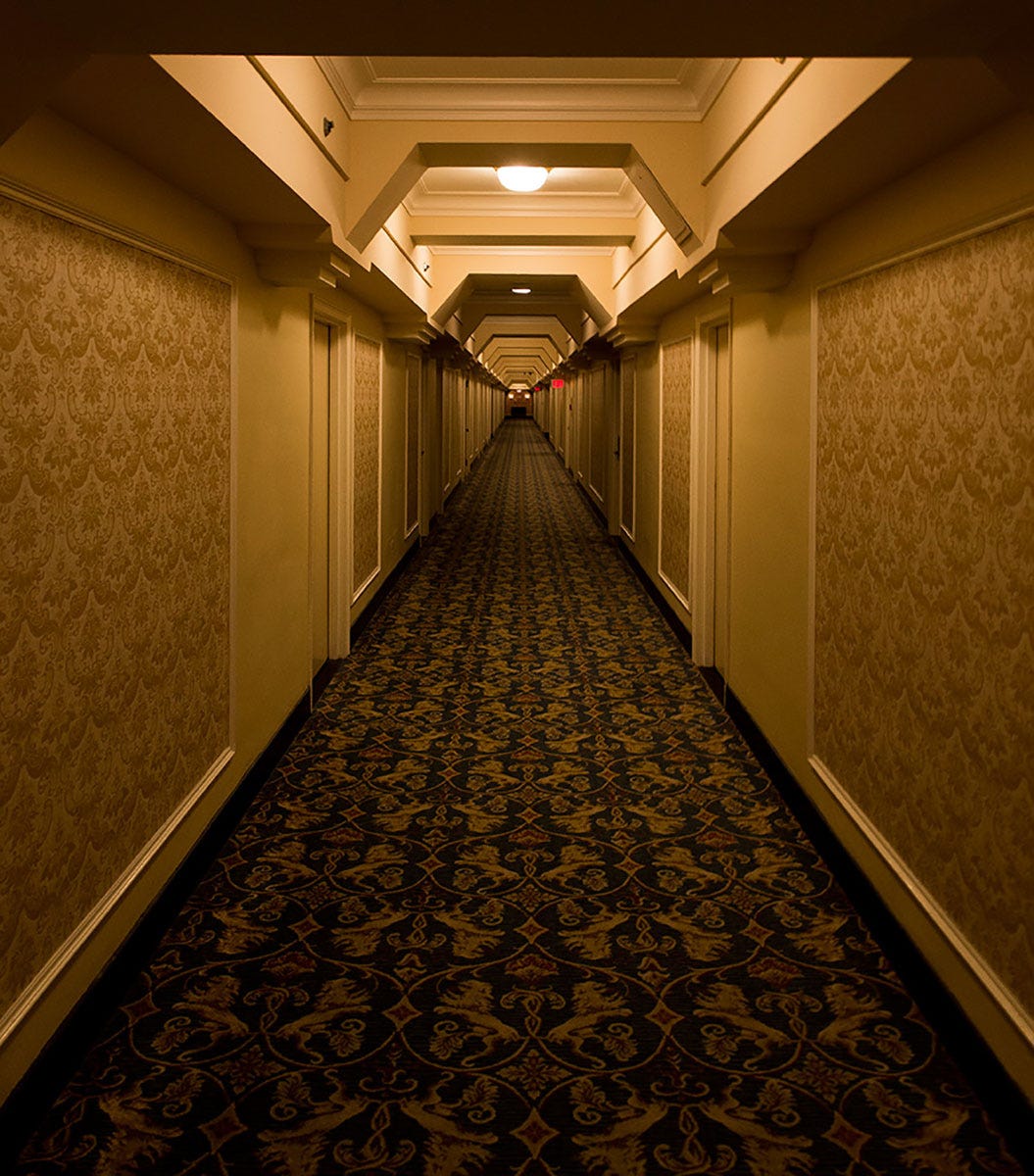Many of you have probably heard of “liminal spaces” in recent internet discourse. Much of it revolves around meme topics such as “The Backrooms” and other so-called liminal spaces which are reached by “clipping out of reality” or similar means. Sadly, these memes are not really very accurate as far as describing liminality as it has been traditionally understood. Indeed, traditional societies have had a deep understanding of the liminal that is worth exploring and examining so as to draw some conclusions about what we see taking place in our own “modern” world.
So what is liminality, liminal space, the liminal anywise? The word itself derives from the Latin limen, meaning “a threshold.” In essence, a liminal place (and this can include metaphorical or conceptual interpretations) is that which exists between two discrete regions, modes of existence, ways of being, and so forth. Anthropologically, liminality was first explored by Arnold van Gennep, who explored the concept of the “rite of passage” as it exists in many traditional “primitive” societies in his 1909 work Rites de Passage. After a decades-long period of abeyance, this area of study was picked up and continued by the anthropologist Victor Turner in the 1960s. In van Gennep’s assessment, so-called primitive rites of passage involved three stages:
Rites of separation - in which the initiate is ejected from his society, breaking with its practices and suffering a metaphorical act of dying.
Transition rites - in which the initiate engages in precisely-defined rituals that represent (or assist) his “crossing the threshold” between his former and soon-to-be coming mode of existence.
Rites of incorporation - in which the initiate rejoins his society, having entered into a new form of existence (e.g. crossing over from boyhood to manhood).
The liminal exists far beyond just anthropological rites of passage and the like. Anyplace where there is a boundary, a place which divides distinct phases from each other, is a liminal space. They exist between the male and the female, between man and machine, between a nation and its neighbour, between childhood and adulthood, between death and life, between the sacred and profane, and so much more. Liminality exists as boundaries and its existence implies order out of chaos and indistinction. Now, those of us on the Right might be tempted to think that this means these spaces are good - they represent order and the separation from chaos, right?
Well, not really. We should understand that the liminal spaces themselves are not order or structure, neither do they create form from chaos. When talking about order (whether physical, social, moral, or otherwise), the discrete regions existing within these boundaries are what are important. The liminal spaces are, in essence, places which exist outside of these regions of order, between and transitional to them, places where neither form of order or being fully exists and where chaos reigns. The spaces don’t create the regions of order, the regions of order exist of themselves and where they “fade out,” the liminal begins.
This is shown in that, traditionally, liminal spaces are understood to be transgressive, places where “the rules” don’t apply, places which can often be subtly wrong. In the example above of rites of passage in “primitive” societies, the initiate who is transitioning from his minority into manhood leaves the place where he was bound by the rules and taboos of his tribe, entering a place of limbo until he satisfies the requirements for reintegration. In many societies, liminal space has been seen as the domain of the outlaw and the exile, the deviant or the outsider.
In man’s folklore and religion, this liminality has often been abhorred. Vampires and other under creatures - themselves existing in the liminal abyss between life and death - could not cross the threshold of a home’s doorstep (at least not without invitation). They must remain within liminal space. Many ancient societies viewed the wilderness that existed between regions of urbanity and cultivation not merely as unkept, but as the abode of evil spirits and wild deities - see Enkidu’s origins as a bestial wild man living in the wilderness who endangers the productive activities of Uruk’s farmers and hunters; also the Bible’s indication of deserts as the dwelling of devils (e.g. Isaiah 34: 14, Matt. 12:43-45, Luke 8:29). These waste places were places that lacked order and right society.
Even in modern, everyday life liminal spaces are not places where humanity finds its right habitation but are only entered temporarily as we move from one place to another. For instance, one example that is often used to explain the concept of a liminal space is that of a hallway, such as in a hotel,
You may cross the hallway space to go to and from your room, but the hallway itself is neither a place for resting nor for conducting your business. Another example is that of flight - suspended in a place of unnatural existence for man (high in the air) as he travels between two places of living and working, a sort of vertical wasteland full of danger and disorder.
So what is my point? Why am I going on about this and what relevance does it have for us today?
Namely this - human society as it exists, especially, in modernity after the French Revolution finds itself beset on all sides by forces of disorder and chaos who seek to abolish the regions of right order and replace them with various modes of liminality. The modern progressive (or more appropriately, transgressive) Left has, from 1789 onward, sought to destroy established order and traditional human society and replace it with disorder and permanent revolution. In other words, the Left has and continues to seek to expand socially, morally, and even physically liminal spaces at the expense of the regions of order and rightness that stood in contradistinction to this liminality.
What do I mean?
Well, let’s take the boundary between male and female. For thousands of years, mankind - whether pagan or Christian - has implicitly understood the reality of God’s created order for man and woman that the two are distinct, though complementary. Even in those rare instances within pagan systems in which some form of androgyny or other breakdown of these gender norms existed ritually, they were always understood to be exceptional, as only existing within rare and esoteric mysteries. They were certainly not taken to be normative or intended to destroy sexual distinctions. Yet, today’s transgender movement explicitly seeks to overturn the distinction between the sexes and bring about a fluid, transgressive, intermediary place where sex can be changed at will and no permanent ordering of such exists.
Likewise with homosexuality and its normalisation. Sexual relation between the male and female both complements and defines the discrete nature of the sexes. Homosexuality breaks this down, creating a liminal region of disorder and unnatural usage. It’s thoroughly unsurprising that the mainstreaming of homosexuality in our society quickly led to the attempted establishment of transgenderism and other deviant sexual forms.
Another of these deviant sexual forms is paedophilia, which is another liminal phenomenon that not only often (though not always) carries with it the preceding disorder between genders, but also that between stages of life. Childhood and adulthood are two distinct times of human development - one which is supposed to be pre-sexual, the other mature and fully developed in human relations in this area. Paedophilia breaks down this distinction and introduces a liminal space in which these stages of life are mingled, confused, and exploited.
Other areas not related to sexuality exist as well. Take, for instance, the Left’s opposition to nationalism and national borders and its support for globalism and mass immigration. For all of human history, discrete human groupings have existed and inhabited their particular lands (just as God intended, by the way). Very little in the way of intermarriage and cultural cross-fusion typically took place and such as did was often viewed with suspicion. Within most traditional societies, the foreigner, the half-breed, and the cultural aesthete were viewed as liminal, as transgressive and never quite “fitting in” anywhere, never really accepted by either host or donor tribe. Even today, mass immigration is intended by progressive globalists to destroy discrete nations and amalgamate them into a worldwide liminal space inhabited by transnational consoomption units.
What about the modern secular progressive obsession with artificial intelligence? AI is the perfect liminal space between man and machine, the organic and the mechanical, a confusion between two categorical modes of existence. On and on it goes. In some way or another, everything that the progressive Left supports and pushes seeks to break down boundaries and perpetuate permanent revolution (which revolution itself is a liminal space between forms of order in government).
Traditionally, the Right stands for order and sociopolitical distinction. Our side understands (or should, at least) that order within human society derives from the order defined by God’s law and God’s creation. Liminal space exists through the rejection of that order and the attempts to normalise that liminality are consciously intended to destroy that order. We should acknowledge that our struggle is not merely against various types of economic silliness or social errors, but against the attempt to destroy order itself and replace it with a world full of chaos.






After the first few paragraphs I began to see why some thus-aligned communities would dash the white observor's brain over the dusty ground and return to life's 'phases' without further undue interruption.
As it happens, for the past fifty or so years, I have lived within such a culture, in North East Arnhem Land, north Australia. Yes, under the tutilige of one's mother's eldest brother, (uncle/Ngapipi), such a move from the community occured for a couple of years, but it was hardly liminal. It was university and military training and yoga and selfawareness and discipline and environmental orientation and seminary, all in one. And this was preceded by a few years by entry into manhood. And it was also the indigenous social security system, the apprenticship transitioning to providieng food when the uncle became too old.
I just wish white people would go away if they ain't got the nouse to grasp the obvious. Advice. Learn the language first, then live within and learn by observation for 20 years, or don't walk here in the first place.
Liminality has its place, or at least some forms of it. It also seems to be where we can get in touch with the Higher, for better or worse (not everything "higher" is good) - an example of this would be the age-old tension in religions between the mystic or saint and the rigid order of codified religion. Liminality can also help finding oneself, with the necessary danger of losing oneself. Rites of passage are an example, or the Amish "Rumspringe".
However, the project to replace society with a permanent state of liminality is pure madness, and might literally invite rule-by-demons. The glorification of liminality at the expense of structure and order was the first step, and look where we are now.